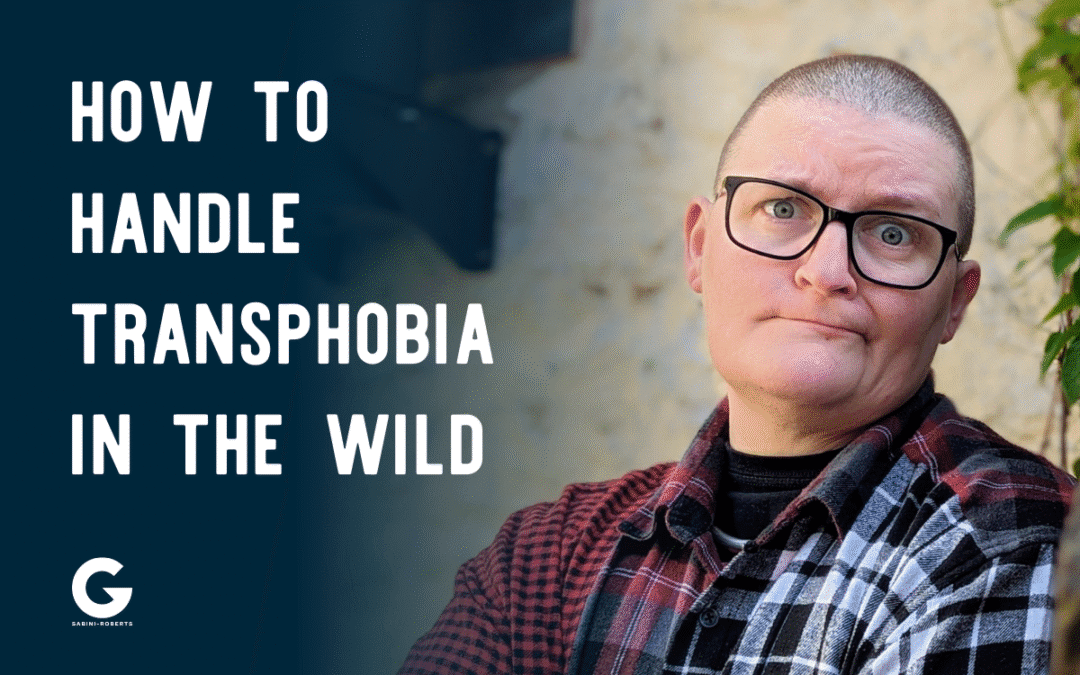What can you do when you witness transphobia in real life situations, particularly if you don’t feel able to respond live and in person in the moment?
I was asked this question recently and it’s a good un, so here we go.
Let’s paint the picture. You’re at an in-person event of some kind and someone in the room announces that all of this modern gender stuff is nonsense. All people with trouser snakes are men and all people with muffs are women and nothing anyone says will convince them otherwise.
We don’t need to list all the things wrong with this kind of statement. If you believe the above to be true you’re hanging out in a corner of the internet that will get probably uncomfortable for you pretty soon. This post is about how to respond well.
And safely.
When faced with a situation like this, even though inside you might be screaming, actually being able to find the words to respond well and have the confidence to state them is hard, especially if you’re still learning yourself.
And let’s not forget, if you challenge someone in a situation like this chances are they will challenge you right back and you’ll find yourself in a very divisive conversation from that point forward. And everyone in the room will be party to it.
I hereby give you permission to not wade into the fray in the moment if you don’t feel safe to do so. Because situations like this can get violent, not just for the people having the conversation but for all the people in the room who will be hearing it and having their own emotional responses.
But that doesn’t mean you don’t do anything.
If no action is taken, that person will go on thinking their attitude is fine, and most likely, supported.
And however shocked or challenged you might be hearing someone say things like that, you do not know who else heard those same words and is trans, or has a trans loved one, or is currently grappling with their own gender identity.
As an ally you can’t NOT take action when something like this happens. But you do not have to armour up and step into an in-person conflict with an audience. I mean, feel free to if you feel able, but there are less immediately volatile ways to go about taking appropriate action.
So in that moment, assess what the safest option is.
It may be that the most helpful thing would be to wait a while before casually mentioning your different perspective, just so that there is evidence of an alternative in the room for all those not able to do this for themselves. This could still trigger conflict, but it caries less potential for being immediately explosive.
It may be that you wait until after the event to take action. That action could take a few forms. You could:
Reach out individually to the people you know in that space who may be affected and offer support.
Reach out to the organisers to make them aware that what happened was not OK and ask them to take action. This is their moment to shine as an example of what inclusive leadership looks like!
Hopefully they will have a policy already to manage inappropriate behaviour in their spaces. If they do, it’s time for them to apply them. If they don’t, they now have hard evidence that they need one and they have a brilliant opportunity to up their diversity and inclusion game.
You could even help them with this. Direct them to someone like me or one of my colleagues in this space for help in doing this well. You could even suggest that some diversity and inclusion training be introduced to help support the group as a whole and encourage more evolved thinking on the part of the person who originally said the inappropriate thing.
What the group leadership do next will tell you a lot about them, that group and that space and you will then be able to decide whether or not to engage with their events in the future.
Talk about your experience, your subsequent actions, and your feelings about it all.
You do not need to do this in a name-and-shame way (unless you want to), but acknowledging that this stuff happens and you will not stand for it makes a huge difference. Messages of solidarity when things like this happen mean so much to those of us who are directly affected so please, never hold back from sharing about your allyship.
And finally, don’t feel bad about not acting in the moment. It is 100% OK for you to make choices that minimise direct conflict and reduce the risk of someone being triggered or traumatised.
You can still be an ally after the event.
You can still inspire change.
And you don’t have to put yourself in the firing line to do it.

